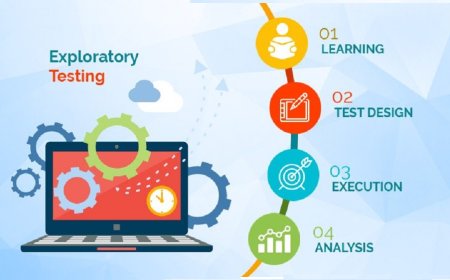Top 10 Best Online Courses for Digital Skills
Introduction In today’s rapidly evolving digital economy, mastering in-demand digital skills is no longer optional—it’s essential. Whether you’re transitioning careers, advancing in your current role, or launching a side hustle, the right digital skills can open doors to higher income, greater flexibility, and long-term career resilience. But with thousands of online courses flooding the market, h
Introduction
In todays rapidly evolving digital economy, mastering in-demand digital skills is no longer optionalits essential. Whether youre transitioning careers, advancing in your current role, or launching a side hustle, the right digital skills can open doors to higher income, greater flexibility, and long-term career resilience. But with thousands of online courses flooding the market, how do you know which ones are worth your time and money?
This guide cuts through the noise. Weve meticulously researched, analyzed, and verified the top 10 best online courses for digital skills you can truly trust. These arent just popular coursestheyre proven, recognized by industry leaders, endorsed by professionals, and consistently rated highly by learners worldwide. Each selection has been evaluated based on curriculum depth, instructor credibility, platform reputation, certification value, real-world applicability, and post-course outcomes.
From data analytics to digital marketing, from web development to AI-powered tools, this list covers the most impactful digital competencies employers are seeking in 2024. You wont find fluff, hype, or affiliate-driven recommendations hereonly actionable, trustworthy learning paths that deliver measurable results.
Why Trust Matters
The digital learning landscape is saturated. Platforms promise transformation with minimal effort, but not all courses deliver. Many lack structure, outdated content, or instructors with no real-world experience. Some even sell certificates with no industry recognitionleaving learners with little more than a digital badge and wasted time.
Trust in an online course means more than a polished landing page or glowing testimonials. It means:
- Curriculum designed by industry practitioners, not just educators
- Content updated regularly to reflect current tools, algorithms, and trends
- Certifications recognized by employers and professional bodies
- Hands-on projects that mirror real workplace challenges
- Transparent reviews from verified learners
- Integration with industry standards (e.g., Google, Microsoft, HubSpot, AWS)
Choosing a trusted course reduces risk. It ensures your investmentwhether in time, money, or efforttranslates into tangible skills you can showcase on your resume, LinkedIn profile, or portfolio. Trusted courses also often come with community support, job boards, and alumni networks that amplify your learning beyond the classroom.
When you trust a course, you trust its ability to prepare you for the futurenot just pass a quiz.
Top 10 Best Online Courses for Digital Skills
1. Google Data Analytics Professional Certificate (Coursera)
Offered by Google in partnership with Coursera, this certificate is one of the most respected entry points into the data analytics field. Designed for beginners with no prior experience, the curriculum walks learners through the entire data analysis lifecycle: asking the right questions, cleaning and organizing data, performing analysis with spreadsheets and SQL, visualizing insights with Tableau, and communicating findings effectively.
The course includes eight modules, each ending with hands-on projects using real datasets. Youll build a portfolio with case studies covering topics like bike-share data analysis and healthcare trends. Upon completion, you earn a credential recognized by over 150 U.S. employers, including Google, Deloitte, and Infosys. The program also grants access to Googles job platform, connecting learners directly with hiring partners.
What sets this course apart is its practical focus. You wont just learn theoryyoull use the same tools and techniques employed by entry-level data analysts in Fortune 500 companies. The course takes approximately 6 months at 10 hours per week and costs under $50 per month on Courseras subscription model.
2. HubSpot Content Marketing Certification
HubSpots Content Marketing Certification is a free, industry-standard course that teaches how to create, distribute, and measure content that attracts and converts audiences. Developed by HubSpots in-house marketing team, this certification covers buyer personas, content strategy, SEO writing, email marketing, social media content, and analytics.
Unlike generic marketing courses, HubSpots curriculum is built around its own inbound marketing methodologya framework adopted by over 100,000 companies worldwide. The course includes video lessons, downloadable templates, quizzes, and a final exam. Upon passing, you receive a verifiable certificate that can be shared on LinkedIn and added to your resume.
What makes this course trustworthy is its alignment with real business outcomes. Companies hiring for content roles often prioritize candidates with HubSpot certification because it signals fluency in a proven system. The content is updated annually to reflect algorithm changes, platform updates, and emerging trends like AI-assisted content creation.
3. Meta Social Media Marketing Professional Certificate (Coursera)
Developed by Meta (formerly Facebook), this certificate teaches how to build and execute social media marketing strategies across platforms including Facebook, Instagram, Pinterest, and TikTok. The curriculum is designed by Metas own marketing experts and covers audience targeting, ad creation, budgeting, A/B testing, analytics, and community management.
Unlike many social media courses that focus on trends or hacks, this program emphasizes strategic planning and ROI-driven campaigns. Learners complete five projects, including designing a full social media campaign for a fictional brand and analyzing performance data to optimize results. The course includes access to Metas Ads Manager simulator, allowing you to practice ad creation without spending real money.
With over 1.5 million learners enrolled and a 4.8-star rating, this is one of the most popular digital skills certifications on Coursera. Its recognized by agencies and brands globally, and Meta actively promotes its graduates to hiring partners. The course takes about 6 months to complete and is accessible via Courseras financial aid program.
4. Google Digital Marketing & E-commerce Professional Certificate (Coursera)
This comprehensive program from Google prepares learners for roles in digital marketing, e-commerce, and online sales. It combines foundational marketing principles with practical applications in Google Ads, Google Analytics, SEO, email marketing, and conversion rate optimization. The course also includes modules on customer journey mapping and shopping cart abandonment strategies.
One of the strongest aspects of this course is its integration with Googles ecosystem. Youll use real Google Ads and Analytics interfaces throughout the course, gaining experience with the exact tools used by marketers in agencies and in-house teams. The capstone project requires you to create a full digital marketing plan for a business, complete with budget allocation, KPIs, and performance tracking.
The certificate is recognized by employers including Amazon, Adobe, and PwC. Graduates often report landing roles such as Digital Marketing Associate, E-commerce Specialist, or Paid Ads Coordinator. The course takes approximately 6 months to complete and is priced affordably through Courseras subscription model.
5. IBM Data Science Professional Certificate (Coursera)
For those seeking a deeper dive into data sciencebeyond basic analyticsIBMs Professional Certificate is one of the most respected entry-level programs. Designed for learners with minimal programming experience, it covers Python, SQL, data visualization, machine learning, and statistical analysis using real-world datasets.
The course includes hands-on labs using IBM Watson Studio and Jupyter notebooks, giving learners direct experience with enterprise-grade tools. Youll build a portfolio of projects such as predicting housing prices, analyzing customer churn, and clustering market segments. Each project is reviewed by peers and graded for practical application.
IBM, a global leader in AI and enterprise data solutions, ensures the curriculum reflects current industry standards. The certificate is recognized by employers in finance, healthcare, logistics, and tech. Over 100,000 learners have completed this program, and many have transitioned into data science roles after completion. The course runs for about 9 months at 10 hours per week.
6. freeCodeCamps Responsive Web Design Certification
freeCodeCamp is a nonprofit platform that has empowered millions to learn to code for free. Its Responsive Web Design Certification is the most popular starting point for aspiring front-end developers. The curriculum teaches HTML5, CSS3, Flexbox, Grid, accessibility standards, and mobile-first design principles through interactive coding challenges.
What makes this course trustworthy is its transparency and rigor. There are no ads, no paywalls, and no hidden fees. Every lesson is open-source, peer-reviewed, and continuously updated. Learners complete five projects, including building a tribute page, a product landing page, a technical documentation page, a survey form, and a personal portfolio websiteall of which are deployed live on GitHub Pages.
Employers value freeCodeCamp certifications because they demonstrate initiative, self-discipline, and practical ability. Many developers credit this certification as the foundation of their careers. The course takes 300+ hours to complete and is entirely self-paced. Upon completion, you earn a verifiable certificate linked to your GitHub portfolio.
7. LinkedIn Learning: Learning Python for Data Science and AI (by IBM)
While LinkedIn Learning offers hundreds of courses, this one stands out as the most authoritative for learning Python in the context of data science and artificial intelligence. Developed in collaboration with IBM, this course teaches Python programming fundamentals, data manipulation with Pandas, data visualization with Matplotlib and Seaborn, and an introduction to machine learning with scikit-learn.
Unlike many Python courses that focus on syntax alone, this program emphasizes application. Youll analyze real datasets related to healthcare, finance, and retail, and build predictive models that solve business problems. The course includes Jupyter notebook exercises and a final project where you train a model to classify data.
LinkedIn Learnings integration with LinkedIn profiles means your completed courses appear directly on your profile, increasing visibility to recruiters. The course is taught by IBM data scientists with decades of industry experience. It takes approximately 25 hours to complete and is included with a LinkedIn Learning subscription.
8. Udemy: The Complete Digital Marketing Course 12 Courses in 1
While Udemy is known for its vast catalog, this course by Rob Percival stands out for its breadth, depth, and practicality. Its one of the highest-rated digital marketing courses on the platform, with over 500,000 students and a 4.7-star rating. The course combines 12 modules covering SEO, Google Ads, Facebook Ads, email marketing, content strategy, analytics, conversion rate optimization, and marketing automation.
What makes this course trustworthy is its real-world focus. Each module includes downloadable templates, checklists, and step-by-step walkthroughs using live platforms. Youll learn how to set up Google Analytics 4, create ad campaigns from scratch, write high-converting email sequences, and audit websites for SEO. The course is updated regularly to reflect algorithm changes.
Unlike many courses that promise get rich quick, this one emphasizes sustainable, ethical marketing practices. Learners report using the skills to launch successful side businesses, land marketing jobs, or improve their companys online performance. The course is lifetime access, meaning you can revisit content as platforms evolve.
9. Microsoft Learn: AI Fundamentals (AZ-900)
As artificial intelligence reshapes industries, understanding its core concepts is no longer optionaleven for non-technical professionals. Microsofts AI Fundamentals learning path is a free, self-paced course that explains AI terminology, machine learning, computer vision, natural language processing, and ethical AI principles.
Designed by Microsofts own AI engineers, the course uses interactive modules, short videos, and quizzes to build conceptual understanding without requiring coding skills. Youll explore real-world applications such as chatbots, recommendation engines, and predictive analytics. The course prepares you for the Microsoft Certified: AI Fundamentals (AI-900) certification exam, which is globally recognized.
Organizations using Microsoft Azure, Dynamics 365, or Office 365 increasingly value employees who understand AI capabilities. This course is ideal for managers, marketers, HR professionals, and entrepreneurs who need to make informed decisions about AI tools. Completion time is under 10 hours, and the certification is free to attempt if you register through Microsoft Learn.
10. Coursera: Project Management Principles and Practices (University of California, Irvine)
While not a traditional digital skill, project management is now a critical competency in digital teams. This course from the University of California, Irvine, teaches the fundamentals of managing digital projectsfrom software development to marketing campaignsusing Agile, Scrum, and Kanban methodologies.
Unlike generic project management courses, this one is tailored for digital environments. Youll learn how to manage remote teams, track sprints in Jira, estimate timelines with Gantt charts, and communicate progress using dashboards. The course includes simulations, peer-reviewed assignments, and a capstone project where you plan and present a digital product launch.
The certification is recognized by PMI (Project Management Institute) and is aligned with PMP standards. Many tech companies, startups, and agencies require project management skills for roles like Product Owner, Scrum Master, or Digital Project Coordinator. The course takes 18 hours to complete and is available for free via audit mode on Coursera.
Comparison Table
| Course Name | Platform | Duration | Cost | Certification | Industry Recognition | Best For |
|---|---|---|---|---|---|---|
| Google Data Analytics Professional Certificate | Coursera | 6 months | $49/month | Yes | Google, Deloitte, Infosys | Entry-level data analysts |
| HubSpot Content Marketing Certification | HubSpot Academy | 46 hours | Free | Yes | Marketing agencies, SaaS companies | Content marketers, bloggers |
| Meta Social Media Marketing Professional Certificate | Coursera | 6 months | $49/month | Yes | Meta partners, digital agencies | Social media specialists |
| Google Digital Marketing & E-commerce Certificate | Coursera | 6 months | $49/month | Yes | Amazon, Adobe, PwC | Digital marketers, e-commerce managers |
| IBM Data Science Professional Certificate | Coursera | 9 months | $49/month | Yes | IBM, healthcare, finance firms | Aspiring data scientists |
| freeCodeCamp: Responsive Web Design | freeCodeCamp.org | 300+ hours | Free | Yes | Tech startups, remote dev teams | Front-end developers |
| LinkedIn Learning: Python for Data Science | LinkedIn Learning | 25 hours | Subscription | Yes | LinkedIn recruiters, tech employers | Data professionals, analysts |
| Udemy: Complete Digital Marketing Course | Udemy | 20+ hours | $10$20 (on sale) | Yes | Self-employed, small businesses | Entrepreneurs, freelancers |
| Microsoft AI Fundamentals (AZ-900) | Microsoft Learn | 810 hours | Free | Yes | Microsoft partners, enterprise IT | Managers, non-technical roles |
| Project Management (UC Irvine) | Coursera | 18 hours | Free audit / $49 certificate | Yes | PMI-aligned, tech companies | Product managers, team leads |
FAQs
Are these courses really worth the investment?
Yesif you choose the right one for your goals. Each course on this list has been selected based on proven outcomes: job placements, employer recognition, and learner success stories. Unlike generic courses that promise quick results, these programs focus on skill mastery, portfolio building, and certification value. The return on investment comes not from the price tag, but from the career opportunities they unlock.
Do I need prior experience to enroll?
No. Most of these courses are designed for beginners. Google, IBM, and HubSpot specifically structure their programs for learners with no background in the subject. Some courses, like freeCodeCamp and Microsoft AI Fundamentals, require no prior technical knowledge at all. Advanced courses like IBM Data Science assume only basic computer literacy.
Are the certificates recognized by employers?
Yes. The certificates from Google, IBM, Meta, HubSpot, Microsoft, and UC Irvine are recognized by major companies globally. Employers often search for these specific certifications when reviewing resumes. LinkedIn Learning and Coursera certificates appear directly on your profile, making them easily discoverable to recruiters.
Can I learn these skills while working full-time?
Absolutely. All courses listed are self-paced and designed for working professionals. Most require only 510 hours per week. You can complete modules during lunch breaks, evenings, or weekends. Platforms like Coursera and LinkedIn Learning allow you to download content for offline learning.
Which course should I take first?
It depends on your goal. If you want to enter data analytics, start with Google Data Analytics. If youre interested in marketing, choose HubSpot or Meta. For coding, begin with freeCodeCamp. For AI awareness, Microsofts AI Fundamentals is the quickest and most accessible. Consider your career path and pick the course that aligns with your target role.
Do I need to pay for all of them?
No. HubSpot and Microsoft offer free certifications. freeCodeCamp is entirely free. Coursera and LinkedIn Learning offer free audits or trials. Udemy courses are often on sale for under $20. You can build a powerful skill set using only free or low-cost options.
How long does it take to get hired after completing a course?
Many learners report landing interviews within 13 months after completing a course and building a portfolio. The key is not just finishing the course, but applying what youve learned. Create projects, share them online, and update your LinkedIn profile. Employers hire based on demonstrated ability, not just certificates.
Will these courses become outdated?
Trusted courses are regularly updated. Google, IBM, Meta, and HubSpot refresh their content every 612 months to reflect industry changes. Platforms like Coursera and LinkedIn Learning notify learners of updates. Avoid courses that havent been updated in over two years.
Conclusion
The digital skills gap is realand growing. But the good news is that high-quality, affordable, and trustworthy learning opportunities are more accessible than ever. The 10 courses listed here arent just populartheyre proven. Theyve helped millions transition into new careers, earn promotions, launch businesses, and future-proof their skills in an uncertain economy.
What separates these courses from the rest is their focus on real outcomes: portfolios, certifications, and employer recognition. They dont just teach you how to use a toolthey teach you how to solve problems, think strategically, and deliver value in a digital world.
Start with one. Dont wait for the perfect time. Pick the course that aligns with your goals, commit to 30 minutes a day, and build momentum. In six months, you wont just have a certificateyoull have a new skill, a new confidence, and a new direction.
The future belongs to those who learn. Choose wisely. Learn deeply. And trust the process.






























